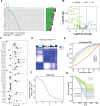Identification of molecular subtypes and a prognostic signature based on machine learning and purine metabolism-related genes in breast cancer
- PMID: 40419914
- PMCID: PMC12114004
- DOI: 10.1097/MD.0000000000042288
Identification of molecular subtypes and a prognostic signature based on machine learning and purine metabolism-related genes in breast cancer
Abstract
Breast cancer (BC), one of the most prevalent malignant tumors worldwide, lacks efficacious diagnostic biomarkers and therapeutic targets. This study harnesses multi-omics data to identify novel purine metabolism-related genes (PMRG) as potential biomarkers and risk signatures. Univariate Cox regression was employed to assess the correlation between PMRGs and BC patient prognosis, while a Lasso Cox model was constructed to derive a prognostic signature. Gene set enrichment analysis was utilized to investigate functional differences. Kaplan-Meier survival curves were plotted to examine overall survival disparities between these 2 risk groups, with further exploration into the relationship between the prognostic signature, immune landscape, and drug sensitivity. Ultimately, a predictive nomogram was developed based on these findings. BC patients were stratified into 2 distinct molecular subtypes with significantly different prognoses using the identified PMRG-based signature, which comprised 17 PMRGs. This signature emerged as an independent prognosticator for BC and was integrated into a nomogram along with age, chemotherapy/radiotherapy treatment history, and clinical staging to accurately predict patient outcomes. Moreover, the signature showed associations with the tumor immune microenvironment and drug responsiveness, where lower-risk patients exhibited increased chemotherapeutic sensitivity, immune scores, and decreased tumor purity. Gene set enrichment analysis highlighted significant activation in pathways such as the complement and coagulation cascades, ribosome biogenesis, MAPK signaling, cAMP signaling, and drug metabolism pathways in the low-risk group. The derived PMRG-based signature holds promise for predicting the prognosis of BC patients and guiding their clinical management, including immunotherapy interventions.
Keywords: breast cancer; immune landscape; immunotherapy; nomogram; purine metabolism.
Copyright © 2025 the Author(s). Published by Wolters Kluwer Health, Inc.
Conflict of interest statement
The authors have no funding and conflicts of interest to disclose.
Figures







References
-
- Giaquinto AN, Sung H, Miller KD, et al. . Breast cancer statistics, 2022. CA Cancer J Clin. 2022;72:524–41. - PubMed
-
- Singh DD, Verma R, Tripathi SK, Sahu R, Trivedi P, Yadav DK. Breast cancer transcriptional regulatory network reprogramming by using the CRISPR/Cas9 system: an oncogenetics perspective. Curr Top Med Chem. 2021;21:2800–13. - PubMed
MeSH terms
Substances
LinkOut - more resources
Full Text Sources
Medical

